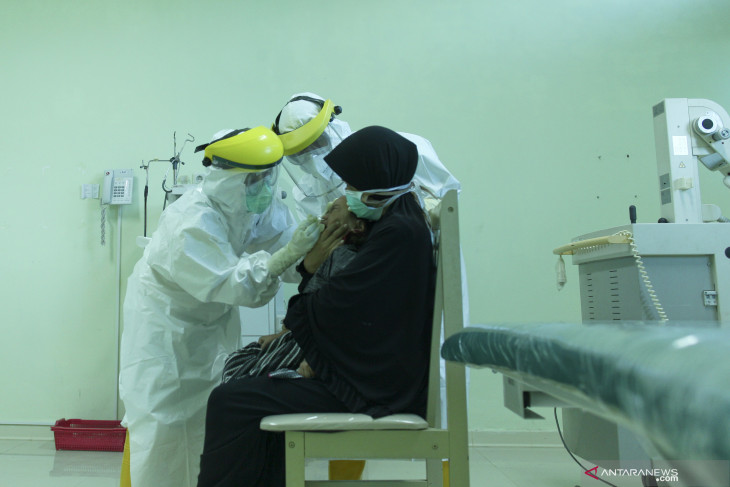Live Streaming
Program Highlight
Company Profile
BPJS Kesehatan Warns Hospitals Over not Charging for Rapid Tests
Written by Ani Hasanah
Arsip Foto. Two medical workers examined a patient's health condition. ANTARA FOTO
The Health Care and Social Security Agency (BPJS Kesehatan) warned its partnering hospitals to not charge the agency’s clients for rapid tests and not make them a pre-requisite to receive their COVID-19-related medical services.
"The rapid tests must not be made a requirement for BPJS Kesehatan clients to receive medical treatment," BPJS Kesehatan spokesman M. Iqbal Anas Ma'ruf noted in a press statement made available to ANTARA in Jakarta on Tuesday.
The agency has sent letters of warning to all its partnering health centers and hospitals to not violate their agreement, he remarked, adding that any client of BPJS Kesehatan can report unlawful acts of the agency's partners to officials of BPJS Satu.
"They can contact the BPJS Satu officials at hospitals. Their contact numbers are available at the hospitals. They may also report unlawful acts to the BPJS Kesehatan Care Center at 1500-400 or its official social media account," he stated.
Coordinating Human Development and Culture Minister Muhadjir Effendy had announced on March 24 that the hospitalization costs borne by COVID-19 patients will be covered by the country's national health insurance provider, BPJS Kesehatan.
The coronavirus outbreak initially struck the Chinese city of Wuhan at the end of 2019, but it then spread to various parts of the world, including countries in the Asia-Pacific region.
The Indonesian government officially announced the country's first confirmed cases on March 2.
Since then, the central and regional governments nationwide have striven persistently to flatten the curve by imposing healthcare protocols and social restrictions.
As of Monday (May 11), the total number of patients recovering from the infection stood at 2,881, while the tally for confirmed COVID-19 cases reached 14,265 nationwide, with 373 cities and districts reporting coronavirus cases.
The number of patients succumbing to the disease rose by 18 to reach 991, according to the Indonesian Government's COVID-19 Task Force.
The health authorities tested 116,358 people using polymerase chain reaction (PCR) and rapid test methods, with at least 102,093 people testing negative for COVID-19.
In breaking the chain of this novel coronavirus disease that has impacted the purchasing power of numerous families in Indonesia, large-scale social restrictions are also applied in several other cities, including Jakarta, Bogor, Depok, Tangerang, and Bekasi.
The central government has also banned homebound travel, or locally known as "mudik," during the fasting month of Ramadhan and Idul Fitri holiday seasons. (ANTARA)



